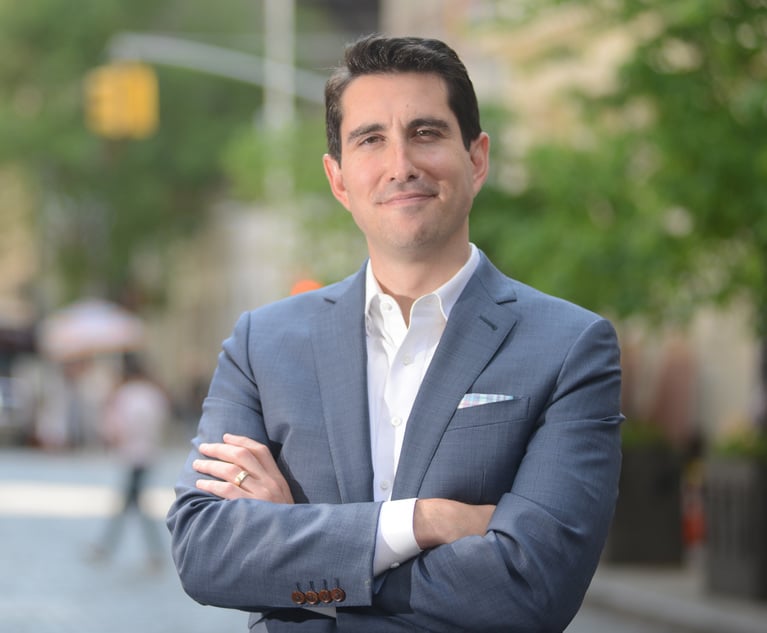Ole Miss Latest School to Seek New GC After NCAA Probe
Lee Tyner, the University of Mississippi's general counsel, has left the school where he has been the top legal officer since 2003.
December 13, 2017 at 05:54 PM
4 minute read
 Entrance to the University of Mississippi. Photo Credit: Katherine Welles/Shutterstock.com.
Entrance to the University of Mississippi. Photo Credit: Katherine Welles/Shutterstock.com. The University of Mississippi has announced that general counsel Lee Tyner, who has been with the school since 1998, has resigned to “pursue other opportunities,” just 10 days after the NCAA ruled against the university over football recruiting violations.
He's not the first GC at a university to leave his post in the wake of college athletics controversy.
Tyner's last day at Ole Miss, as it is affectionately called, will be Dec. 31, the Jackson (Miss.) Clarion Ledger newspaper reported Monday. The university said associate GC Perry Sansing will become interim general counsel at the start of 2018, while the school conducts a national search to fill the position.
Tyner, who could not be immediately reached for comment, had served as the university's top legal officer since 2003 after joining the school as an attorney five years earlier. He also regularly taught courses in business law and communications, according to his university bio.
The GC had led the university's defense in the nearly five-year-long investigation by the National Collegiate Athletic Association. The NCAA said six football staff members and 12 boosters were involved in the violations, which included giving about $37,000 in cash to prospects, as well as automobiles, lodging, transportation, meals and apparel. Two staff members also helped arrange fraudulent standardized test scores for three prospects.
On Dec. 1, the NCAA announced that the university “lacked institutional control in its football program” and imposed a list of penalties that included three years of probation until Nov. 30, 2020; a financial penalty of $5,000 plus 1 percent of its average football budget for three years, which was calculated at $179,797; and a two-year ban on participating in bowl games.
“Some Ole Miss fans were often critical of the fact the university pursued a path of cooperation during the NCAA process,” the Clarion Ledger article said.
The school said it would appeal the NCAA ruling. “We're appealing this case because we were not given proper due course and we are concerned about that,” Chancellor Jeff Vitter told the newspaper.
Ole Miss is not the first school to shake up its general counsel's office during or after an NCAA investigation.
In September 2017, the NCAA found that Rutgers University had failed to properly monitor its football program resulting in violations. The school has had a series of in-house legal chiefs.
First in 2013, Rutgers replaced general counsel John Wolf, who resigned over his role in a decision to suspend rather than fire a head basketball coach who was found to be abusive to players in practice. The school then named John Farmer Jr., a former New Jersey attorney general and then dean of Rutgers Law School, to the GC post on an interim basis.
In February 2016, after Rutgers had suspended its head football coach for three games in late 2015 over NCAA violations, the school named John Hoffman, then acting attorney general for New Jersey, to the general counsel job.
The University of North Carolina also shook up its GC office during a recently resolved NCAA investigation of an academic scandal at the school that involved athletes. In 2011, a North Carolina newspaper reported on a suspicious “paper” course that many athletes were taking.
The school conducted several internal investigations, with the first one led by Leslie Strohm, then UNC's general counsel. As public outrage continued, the school hired an outside lawyer in 2014 to conduct an independent investigation, and he found “a fundamental failure to conduct sufficient oversight.”
Strohm was replaced by an interim GC in January 2015. And in the fall of 2016 the school named veteran Charlotte attorney Mark Merritt as its new general counsel.
Meanwhile the NCAA launched its own probe of the academic scandal. It concluded in October 2017, finding that, because the lenient classes were also open to regular students, not just athletes, there was no unfair benefit to school athletes, and therefore no violation. But the damage to UNC's reputation had already been done.
This content has been archived. It is available through our partners, LexisNexis® and Bloomberg Law.
To view this content, please continue to their sites.
Not a Lexis Subscriber?
Subscribe Now
Not a Bloomberg Law Subscriber?
Subscribe Now
NOT FOR REPRINT
© 2025 ALM Global, LLC, All Rights Reserved. Request academic re-use from www.copyright.com. All other uses, submit a request to [email protected]. For more information visit Asset & Logo Licensing.
You Might Like
View All
Survey Finds Majority of Legal Professionals Still Intimidated by AI Despite Need to Streamline Mounting Caseloads

Kraken’s Chief Legal Officer Exits, Eyes Role in Trump Administration
3 minute read
FTC Chair Lina Khan Sues John Deere Over 'Right to Repair,' Infuriates Successor
6 minute read
‘Facebook’s Descent Into Toxic Masculinity’ Prompts Stanford Professor to Drop Meta as Client
6 minute readTrending Stories
- 1DC Bar’s Proposed Anti-Discrimination, Harassment Conduct Rule Sees More Pushback
- 2California's Chief Justice Starts Third Year With Questions About Fires, Trump and AI
- 3Justin Baldoni Sues Blake Lively and Ryan Reynolds for $400M in New Step in 'It Ends With Us' Fight
- 4Top Leadership Changes Coming for NJ Attorney General's Office
- 5SCOTUSBlog Co-Founder Tom Goldstein Misused Law Firm Funds, According to Federal Indictment
Who Got The Work
J. Brugh Lower of Gibbons has entered an appearance for industrial equipment supplier Devco Corporation in a pending trademark infringement lawsuit. The suit, accusing the defendant of selling knock-off Graco products, was filed Dec. 18 in New Jersey District Court by Rivkin Radler on behalf of Graco Inc. and Graco Minnesota. The case, assigned to U.S. District Judge Zahid N. Quraishi, is 3:24-cv-11294, Graco Inc. et al v. Devco Corporation.
Who Got The Work
Rebecca Maller-Stein and Kent A. Yalowitz of Arnold & Porter Kaye Scholer have entered their appearances for Hanaco Venture Capital and its executives, Lior Prosor and David Frankel, in a pending securities lawsuit. The action, filed on Dec. 24 in New York Southern District Court by Zell, Aron & Co. on behalf of Goldeneye Advisors, accuses the defendants of negligently and fraudulently managing the plaintiff's $1 million investment. The case, assigned to U.S. District Judge Vernon S. Broderick, is 1:24-cv-09918, Goldeneye Advisors, LLC v. Hanaco Venture Capital, Ltd. et al.
Who Got The Work
Attorneys from A&O Shearman has stepped in as defense counsel for Toronto-Dominion Bank and other defendants in a pending securities class action. The suit, filed Dec. 11 in New York Southern District Court by Bleichmar Fonti & Auld, accuses the defendants of concealing the bank's 'pervasive' deficiencies in regards to its compliance with the Bank Secrecy Act and the quality of its anti-money laundering controls. The case, assigned to U.S. District Judge Arun Subramanian, is 1:24-cv-09445, Gonzalez v. The Toronto-Dominion Bank et al.
Who Got The Work
Crown Castle International, a Pennsylvania company providing shared communications infrastructure, has turned to Luke D. Wolf of Gordon Rees Scully Mansukhani to fend off a pending breach-of-contract lawsuit. The court action, filed Nov. 25 in Michigan Eastern District Court by Hooper Hathaway PC on behalf of The Town Residences LLC, accuses Crown Castle of failing to transfer approximately $30,000 in utility payments from T-Mobile in breach of a roof-top lease and assignment agreement. The case, assigned to U.S. District Judge Susan K. Declercq, is 2:24-cv-13131, The Town Residences LLC v. T-Mobile US, Inc. et al.
Who Got The Work
Wilfred P. Coronato and Daniel M. Schwartz of McCarter & English have stepped in as defense counsel to Electrolux Home Products Inc. in a pending product liability lawsuit. The court action, filed Nov. 26 in New York Eastern District Court by Poulos Lopiccolo PC and Nagel Rice LLP on behalf of David Stern, alleges that the defendant's refrigerators’ drawers and shelving repeatedly break and fall apart within months after purchase. The case, assigned to U.S. District Judge Joan M. Azrack, is 2:24-cv-08204, Stern v. Electrolux Home Products, Inc.
Featured Firms
Law Offices of Gary Martin Hays & Associates, P.C.
(470) 294-1674
Law Offices of Mark E. Salomone
(857) 444-6468
Smith & Hassler
(713) 739-1250






